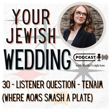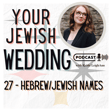
25 - Passover Seder Basics (Especially for First-Timers!)
Here’s exactly how to plan a QUICK and EASY Passover Seder for first-timers. The most important thing is to start somewhere and to always ask questions!
If you’re short on time, go straight to 13:45
One-Sheet Haggadah:
https://drive.google.com/file/d/10AMF__xWaP27AZBOUy-EDgMFN1uZq0cO/view?usp=sharing
History of the Haggadah:
Don't forget - you can reach me (Rabbi LeighAnn) any time at www.yourohiorabbi.com or everyonesfavoriterabbi.com or rabbileighann.com !
Fill out the contact form there if you'd like to work with me on your wedding. There are SO many options, from Ketubah consulting to ceremony planning. If there's something you have in mind, don't hesitate to ask - I'm here to help!
IG: @yourohiorabbi
Podcast IG: @yourjewishweddingpodcast
Send questions for me to answer on this podcast to:
yourjewishweddingpodcast@gmail.com
Hope to see you next time! Remember - there is ALWAYS more learning to do!
<3 Rabbi LeighAnn
Here’s exactly how to plan a QUICK and EASY Passover Seder for first-timers. The most important thing is to start somewhere and to always ask questions!
If you’re short on time, go straight to 13:45
One-Sheet Haggadah:
https://drive.google.com/file/d/10AMF__xWaP27AZBOUy-EDgMFN1uZq0cO/view?usp=sharing
History of the Haggadah:











